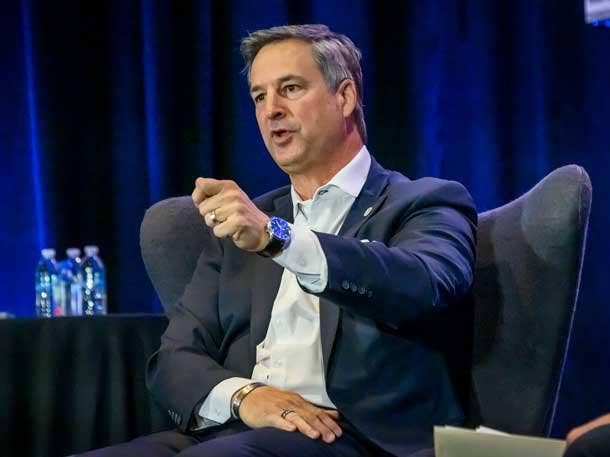Friend Or Foe? Dell’s Marius Haas On AWS Outposts
"At first when I saw [VMware CEO] Pat [Gelsinger] and VMware get really close in aligning with AWS, I was worried. I said, ‘Where is this going? Are we creating our own competitive ecosystem?’” says Marius Haas, president and chief commercial officer at Dell Technologies.

When Dell Technologies‘ Marius Haas first heard that VMware was teaming with Amazon Web Services to create an on-premises architecture, known as AWS Outposts, he was worried.
“At first when I saw [VMware CEO] Pat [Gelsinger] and VMware get really close in aligning with AWS, I was worried. I said, ‘Where is this going? Are we creating our own competitive ecosystem?’” said Haas, president and chief commercial officer of the $91 billion infrastructure giant, at the 2019 Best of Breed Conference Tuesday. “Then in hindsight, it was brilliant because now they bridge the ability to manage an on-premises environment—which customers are really comfortable with and understand—and now you can seamlessly start to harness the opportunities that the public clouds provide for certain workloads.”
It’s been nearly a year since VMware, which is part of the Dell Technologies family, unveiled its partnership with AWS to create a new hybrid cloud on-premises architecture called AWS Outposts that includes VMware’s integrated software and management agent stack, VMware Cloud Foundation. Although Outposts has yet to become generally available, Dell has since launched its hybrid cloud Dell Technologies Cloud platform that includes VMware Cloud Foundation and hyper-converged infrastructure offering VxRail.
[Related: Michael Dell On HPE GreenLake: ‘We’ll Let Our Share Speak For Itself’]
Haas said the largest Software-as-a-Service providers in the world are lining up to buy VMware Cloud Foundation as they seek a multi-cloud, hybrid cloud environment.
“The first one that came knocking on the door was Oracle. Obviously, a big database company, clearly data is important. They realize that [their] ecosystem is evolving,” said Haas.
Haas, who is responsible for driving Dell’s global go-to-market organization as well as channel sales, said customers want the ability to manage applications and their data seamlessly across their cloud ecosystems. “Guess what? The VMware Cloud Foundation, VCF, does that for you. It enables you to have one management ecosystem that can go seamlessly to AWS, can go seamlessly into [Microsoft] Azure, we’ll go seamlessly into Google Cloud, seamlessly into Oracle,” he said.
The vast majority of CIOs want to have an on-premises or hosted private cloud ecosystem for their most critical applications and data, according to Haas, which is where he said Dell infrastructure will play a key role alongside VMware.
“You have 93 percent of the CIOs say, ‘I’m going to have an on-premises or hosted private cloud ecosystem for my most critical applications, my most critical data. No doubt it’s happening, so guess what? I’m going to entrust Dell to deliver that infrastructure. I’m going to put it on the VMware Cloud Foundation to manage it, and I’m going to be able to do it seamlessly,” said Haas. “Look, we have 600,000 customers on vSphere, we know how that works. It’s a known entity. The Dell Technologies family is going to make that easier and easier to manage for [customers].”
Scott Miller, senior director of strategic partnerships at Maryland Heights, Mo.-based World Wide Technology, an $11 billion solution provider powerhouse, said Dell Technologies has been “brilliant” in transitioning to the public cloud.
“It was brilliant and really smart of Pat [Gelsinger] and [Dell Technologies CEO] Michael [Dell] to understand how to pull that in. Containers could have been a huge threat to VMware, so they found the industry standard and brought it in and now they manage it. Public cloud could have been a big threat to VMware and Dell, and instead of it being a big threat, instead of them trying to compete with it and do their version of public cloud, they quickly realized, ‘Oh it’s just better for me to put my arms around that and have an ‘also’ strategy with public cloud,’” said Miller. “Pubic cloud is here to stay, just like on-premises is here to stay. It’s not going to be one thing solves everything, despite what your sales rep at AWS might tell you.
“The complexity has become greater and the need for the channel has become greater because you have to navigate all of it for the customer and find the right opportunities,” said Miller. “We feel like we’re in a really good spot to do that will Dell.”